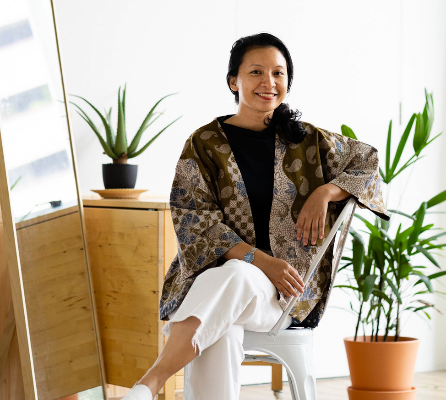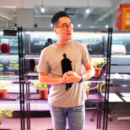
The power of roots and storytelling
Ms Aqilah Zailan shares how making genuine connections, as part of building her brand DNA, has allowed Studio Gypsied to stand out from the crowd.
If you trace the path that led Ms Aqilah Zailan to becoming an entrepreneur, it will start with a young girl struggling with her own cultural identity growing up as a Javanese-Malay Singaporean.
Later in her adulthood, an introspective trip to Sumatra allowed her to develop greater appreciation of her Javanese heritage. According to Ms Aqilah, it was batik — its symbolism and the stories behind it — that really set her on the path of self-discovery, and later, establishing her own fashion label.
In 2013, she founded Studio Gypsied, a slow fashion and lifestyle label that holds batik and heritage textiles and Southeast Asian artisans at its core, to fill the gap in the market for batik textiles. She started small with accessories such as headbands and clutches, sewing everything on her own, before expanding the product line to include apparel.
Throughout it all, her ability to weave stories into her brand helped propel Gypsied forward, one batik motif at a time.

Taking charge of her own story
According to Ms Aqilah, the name Studio Gypsied came from her close friend who likened her free-spirited personality to a gypsy. “I always had grand ideas for my independence and how I wanted my life story to pan out,” she explained.
Perhaps it was this determination to take charge of her own story that led her to this chapter of her life — she was a Law and Management student after all, a far cry from fashion. But a year working in the law industry, and she decided it wasn’t for her, so she pursued Business Management in university.
It was her passion for serving customers that eventually placed her in the fashion industry. She has been in retail sales since she started working part-time at 14, then worked her way up to eventually handle retail operations and marketing for local jewellery and fashion brands after graduating.
“Being on the sales floor also allowed me to make observations about what people want and what makes them tick. Closing a sale and forging an authentic connection with customers fulfilled me.”

Authentic storytelling
To her, it is more than just selling accessories and apparel, but personal stories and values as well. She explained that she has come to learn that customers also want to know that they are supporting a brand that only has beautiful products but also shares the same values as them.
“As a kid, I was a keen writer of stories and my time in retail sales revealed to me how much consumers crave authentic connections both to the product and brand that they buy from,” she said. As a young adult finding her place in the world, this aligned with her, and she let storytelling take the lead in everything she did.
“Stories shape how we view the world. With Gypsied’s branding, I wanted to write and share narratives that influence women with fresh perspectives and ideas. I was fortunate to work with brands that also believed in the power of storytelling, and I was able to hone this ability over the years.”
Standing out from the crowd
One might think that entering an industry that is already saturated can be challenging. Fortunately for Ms Aqilah, Gypsied has carved out its own unique voice that has helped it stand out naturally. “But this is a double-edged sword; when you are free spirited and don’t fit into any mainstream definition, growth is slower.”
However, as the brand matured, so did the consumers. The world began opening up to the concept of slow fashion and sustainability, values that Gypsied has embodied right from the start. She also pointed out two events that shaped the industry — the collapse of Rana Plaza factory in Bangladesh and the COVID-19 pandemic. Both accelerated consumer understanding of slow fashion and the importance of an equitable fashion supply chains.

A new season
Currently, Ms Aqilah is readying her brand for the post-pandemic world and its next phase. “We can only tell the stories that need to be told when we pay attention to the needs of the world we live in. And that requires listening very closely. Behind the scenes, many conversations are happening with our community, and artisan and tailoring partners,” she explained.
On the business front, she is also redesigning her supply chain, having gathered enough data from Gypsied’s success since its inception. “It has been a survival mode type of supply chain that was more reactive. I hope to create a more reliable supply chain for our brand, reducing wait time for our pre-orders and a smoother journey from crafting batik to tailoring.”
She plans to have more transparency within the supply chain to advocate the Gypsied’s stance in slow and conscious fashion. This year, customers can also look forward to original batik motifs from the brand and its transition to certified organic cotton.
Her advice to entrepreneurs? “Energy is finite, and running a business is a marathon, not a sprint.” She also believes in understanding one’s limits as success is determined by how much you can devote to it.


















